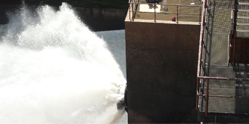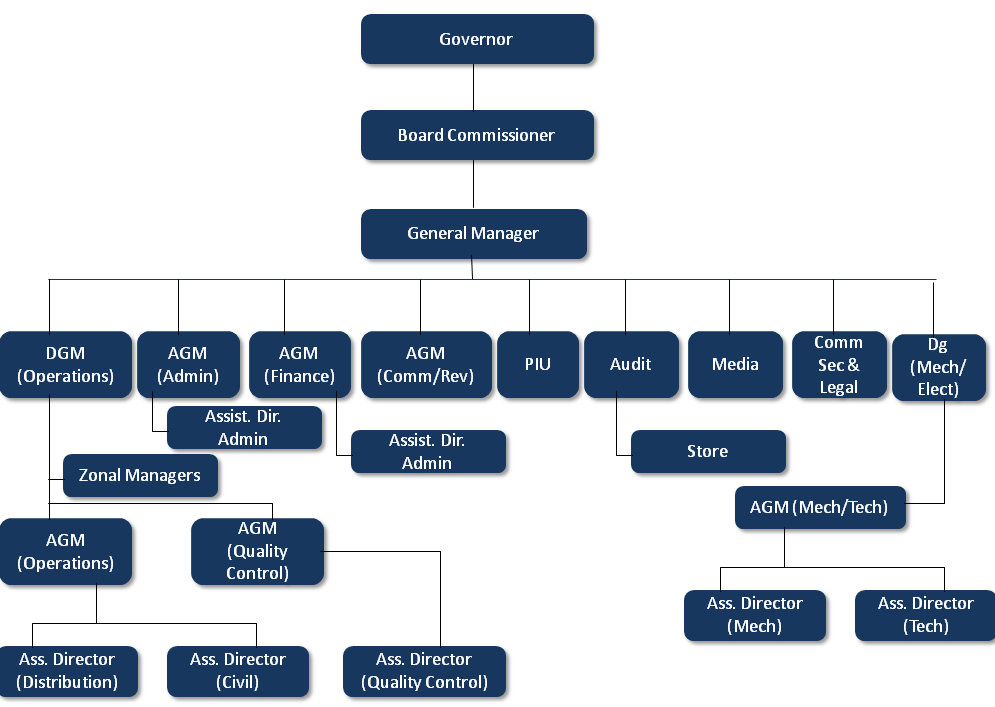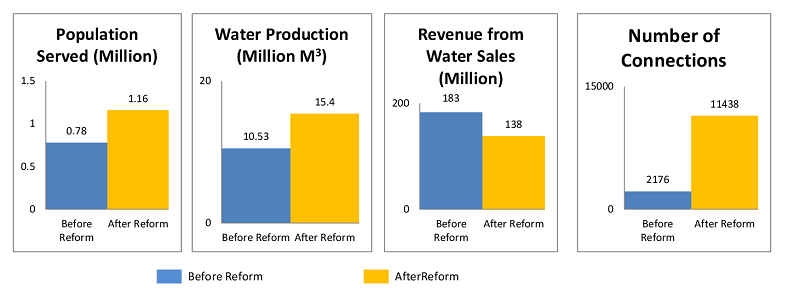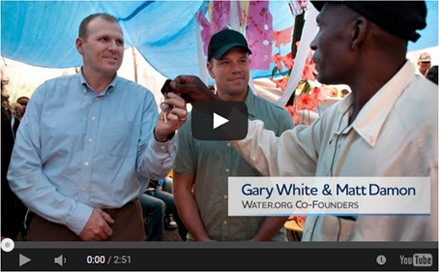
Ogun State Water Corporation (OGSWC) is the government utility responsible for water supply in the cities of Ogun State, though; the water supply situation in the cities of Ogun State was unreliable, due to the poor infrastructure and operational capacity of the OGSWC. This gave rise to the National Urban Water Sector Reform Project (NUWSRP) to improve the reliability of water supply. The Corporation has Eleven Operational Business Areas/cost centres as follows; Abeokuta, Sagamu, Ijebu-Ode, Ijebu-Igbo, Ota, Ogbere, Ilaro/Papalanto, Omu, Odogbolu, Aiyetoro and Iperu. The Corporation organizational structure is as shown below:

Most of the water supply schemes in Ogun State were commissioned in the 1960’s and 1980’s. Due to the funding gap over the years, the OGSWC operations were greatly hindered. All the water production facilities were operating far below capacity, and the utility was not able to meet the demand of an increasing population. The following key activities of the reform programme have helped in the improvement of the water supply situation in the State;
Rehabilitation of existing water facilities and pipe network, and the development of new water works and network expansion were carried out by the reform programme. Specifically, the following water production facilities were rehabilitated;
| Indicators | Unit | Baseline | Current figure (As At November 2014) | % change |
| Water production in million M3 | Million m3 | 10.534 | 15.403 | 46.2% |
| Total length of Distribution network rehab./Constructed | Km | 0.0 | 70.5 | - |
| No of connections | No | 33,939 | 41,491 | 22.3% |
| Population served from the systems under rehabilitation. | No X 106 | 0.783 | 1.161 | 48.3% |
| Efficiency | % Billing | NA | 75 | |
| % Collection | 49 | 33 | -16% | |
| Total cost of production in =N=million | =N=million | 389.773201 | 646.86099343 | 66% |
| Revenue from Water sales in =N=million. | =N=million | 183.848838 | 138.102215 | -25% |
| Cash operating ratio | Ratio | 27% | 21% | -23% |
 Key Indicators for OGSWC - Recorded Increase
Key Indicators for OGSWC - Recorded Increase
The reform programme in Ogun State also supported the improvement of water governance and human capacity development in the State water utility. The reform supported the development and approval of State Water and Sanitation Policy, and the development of a draft water bill for the Ogun State water sector, which has been passed into law by the Ogun State House of Assembly. Human capacity development activities were focused on the improvement of the operational and managerial capacity of the OGSWC staff for the effective management of the State Utility.
Operational reforms were implemented to improve the effectiveness of the OGSWC. The focus was to improve communication, customer service, and response time. The utility created customers help desks and reactivated its customer care unit for better customer care services.
The urban water supply reforms in Ogun State recorded some successes in the rehabilitation and expansion of physical infrastructure, and also the improvement of human and operational capacity of the state water utility. However, some challenges were recorded as well. The following are the key challenges the reform programme encountered in Ogun State; Physical Infrastructure Activities The biggest challenge in the rehabilitation and expansion activities was the suspension of water supply operations in most of the areas that were receiving supply. Production operations at the major plants had to go on simultaneously with rehabilitation and other civil works activities, leading to added time in the physical works activities. Inadequate power supply is another challenge that has limited the use of new production plants installed by the reform programme.
Though a Water and Sanitation Policy has been put in place, a Water Law that will define the legal framework for the water sector in the State is yet to be passed. A draft Water Bill has been developed and presented to the State Executive Council for approval and onward delivery to the Ogun State Legislature. The Bill, when passed into Law, will create the enabling environment for Private Sector Participation in the water sector of the State, and also create an Independent Water Regulatory Commission for the regulation of the water sector in the State.
The most significant operational challenges of the OGSWC are;
Reform Challenges The NUWSRP in Ogun State recorded a lot of successes in the utility, However, it meet some challenges which includes:
The NUWSRP in Ogun State has supported the rehabilitation of water production plants, water supply pipelines, and the extension of water supply services to more people in the State. Customer care has been reformed to improve communication and services to the people of the State. The members of staff of the OGSWC have been trained both locally and internationally to ensure that the required human capacity is available for sustainable services. A water and sanitation policy has been approved by the State Executive Council, and the Draft Water Bill which was developed with the support of the NUWSRP has been passed into law. The Water Law will provide the legal framework for the water sector in the State.

